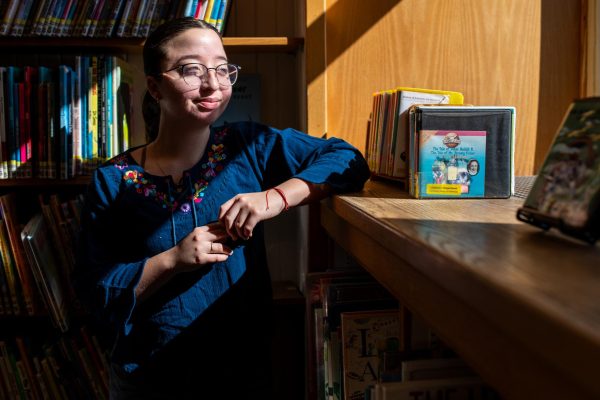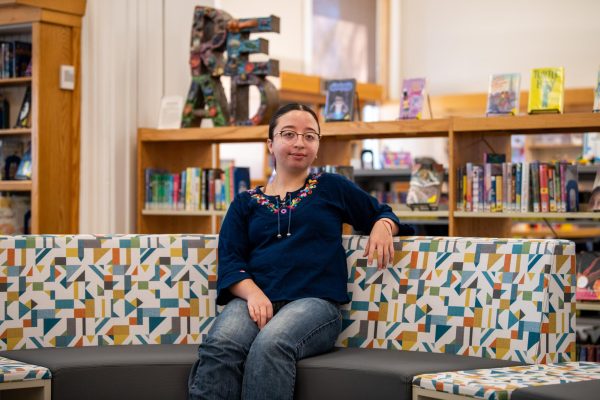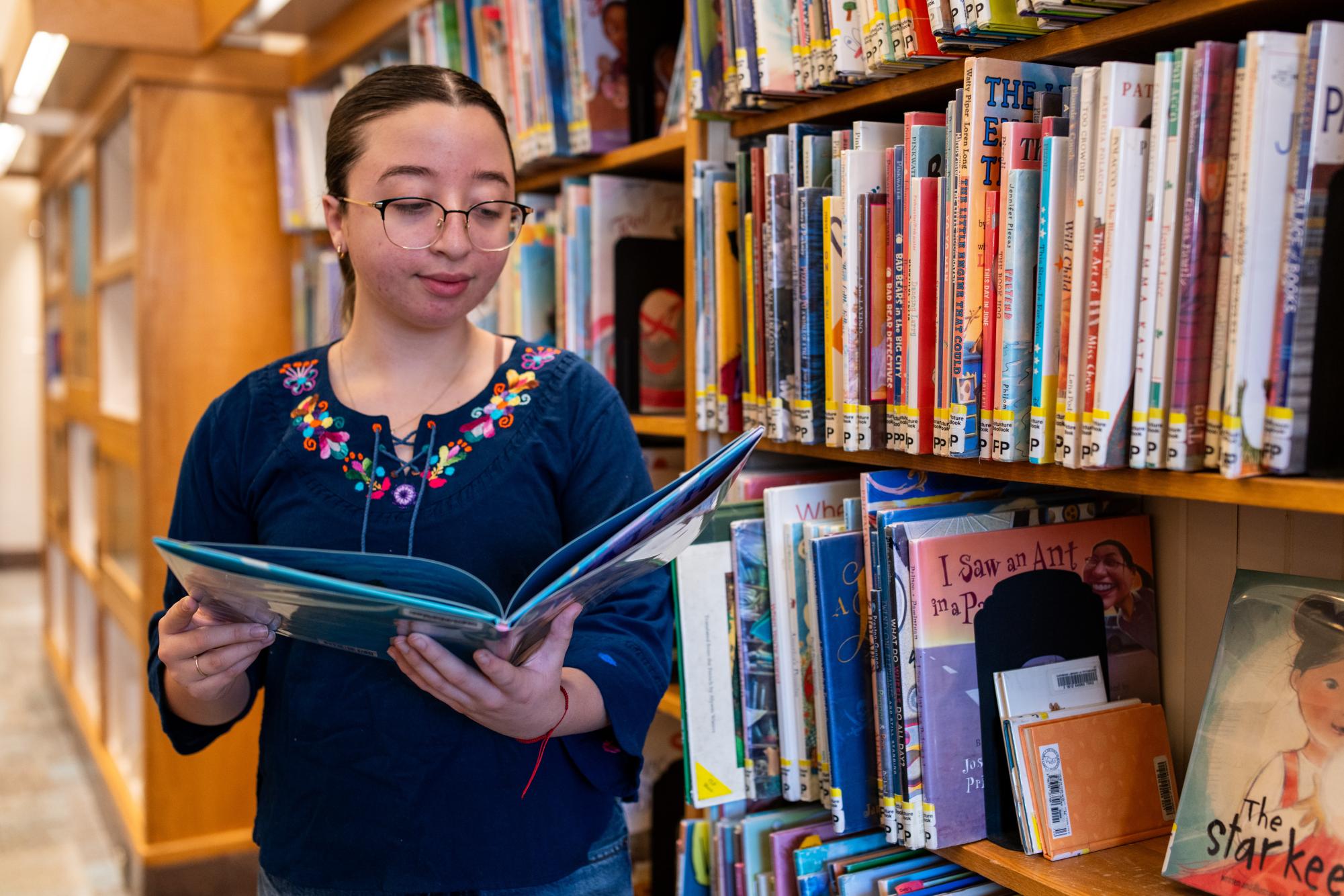As the founder of APPLE — not Silicon Valley’s, but the student organization Assisting Philanthropic Professionals Lead Education — Stephany Andrade takes the field of education very seriously. From her initiatives to enrich the community of education students at Pitt to her work at Faison K-5 School pursuing equitable learning through Hatch Partner’s Playlab, Andrade seeks to improve the lives of learners and educators in Pittsburgh and beyond.
Her work begins at Pitt, where she serves as a resident assistant in Holland Hall. Sophomore teacher education and English literature double major Andrade wants to see the first-year students on her floor thrive at Pitt, and she sees her RA position as a way to offer younger students some direction in their brand-new environment.
“I think that being an RA takes me to that next level of impacting the community that is literally right where I live,” Andrade said. “I try to be the best RA I can. This is not just about housing, this is not just about tuition — this is about me making an impact on first year students.”
Her efforts do not go to waste, as the women living on the eighth floor of Holland Hall agree that Andrade is “the perfect RA.”
“With RA Steph as our RA, we have learned this campus, made lifelong friends with the women on our floor and fell in love with this college,” her residents said in a collective statement. “Steph is the embodiment of what it means to be an RA and has made the transition from home to college a wonderful journey.”
During her own first year in college, Andrade received mentorship from the TRIO Student Support Services. Andrade is a first-generation American and a first-generation college student, but the weight of those labels didn’t hit her until her first semester at Pitt. She arrived on campus unsure, like other first-generation students, how to talk to her professors, conduct research or even select her classes.
Andrade now works as a peer mentor for TRIO SSS and helps first-generation students navigate the same difficult process she experienced as a first-year. She guides them through everything from emailing professors to filling their financial aid — anything to make their college journey less stressful.
Michele Lagnese, director of TRIO SSS, had only positive things to share about Andrade, saying she was sure Andrade would surpass every goal she set.

“[Andrade] approaches life with an exceptionally high level of enthusiasm, initiative and dedication,” Lagnese said. “I cannot wait to see how her passion makes this world better.”
Andrade is already working on bettering the world of education outside of the University of Pittsburgh at Faison K-5 School in Homewood, where she interned for a year. She worked through Hatch Partners in Play to bring their Playlab framework to the school for grades K-3.
Playlab involves extended periods of child-led play to facilitate socioemotional learning, problem solving skills and interpersonal collaboration. Andrade says the program serves as a kind of emotional healing for the children, many of whom have trauma from living in a low-income area with high rates of gun violence and incarceration. She believes it helps the students both cope with their trauma and form connections that they might not make in a traditional classroom setting.
“We had a student who came from a South American country and did not speak English at all, and he and his classmates were playing in the Playlab and communicating,” Andrade said. “One was speaking English, one was speaking Spanish, but they were playing together. I think it really shows the connectivity that can happen between students when you take out the barrier of, ‘I have to get an A.’”
Hatch Partners in Play has a focus on equitable learning, helping schools in low-income areas secure similar opportunities to somewhere like The Fanny Edel Falk Laboratory School, a private K-8 school facilitated by the University of Pittsburgh.
“[The students at the Falk school] learn through play all the time,” Andrade said. “But when you look at underserved schools, they don’t have the resources or money or funding to be able to get those tools into the classroom.”
Andrade has also brought her passion for education to older children in fourth and fifth grade through her involvement in Strong Women Strong Girls, a mentorship program for women and girls with chapters in both Pittsburgh and Boston. She says the program teaches young women how to be leaders in any career path they are interested in.
Andrade highlighted the importance of helping the mentees grow into themselves at a very crucial point in their journey of self-discovery.
“They’re trying to figure out who they are, what their identities are, what they want to look like, what they want to feel like, what pronouns they want to use,” Andrade said. “We walk hand in hand with them in understanding that however you want to identify, however you want to lead, is okay. This is how you do it, and these are the resources that are out there for you.”
Everyone who identifies as a woman is welcome at SWSG, and the organization has several sites located in various schools throughout Pittsburgh. The mentors are assigned a new site every semester, and Andrade has gotten to work with some of the same students for multiple semesters. She said SWSG allows her to build a strong connection with the students and their families and enriches the Pittsburgh community as a whole.

Andrade plans to apply all her work in the Pittsburgh community — from the elementary schools to Pitt — to a future in education policy. She hopes to begin her career teaching before pursuing a congressional position, where she can propose new laws and fight for change within education.
“I think it’s very important that if you are going into education policy that you are an educator, which is what really lacks in our legislation right now,” Andrade said. “People that are trying to do educative legislation or policy have not been educators. They have not experienced what it is like to be in the trenches.”
Andrade is practicing for her future in education policy through her work as a student liaison in the University Center for Teaching and Learning. There she consults with Pitt professors to help improve their syllabi, coursework and teaching style by offering a student’s perspective on how they conduct their classes.
The current focus of Andrade’s work is introducing generative AI into the classroom by getting professors to see past its drawbacks and consider the potential for it to be a tool offered to students.
“Going into my position as a student liaison, one of my tasks was to use Chat GPT 4.0 and try to see what the benefits are as an undergraduate student,” Andrade said. “I was really able to explore it without any fear of [violating] academic integrity, and I started becoming really passionate about exploring how to improve AI for students.”
Andrade’s passion for educational improvement and community service comes from a genuine care for the lives of students, and she firmly believes there is no one correct way for a person to help their community.
“There’s this prejudice on community service as, ‘You have to be in a soup kitchen,’” Andrade said. “[But] volunteering is so diverse that you can do it however you find it interesting.”
No matter how someone chooses to volunteer and help out, Andrade says it should not be a stepping stone or simply just something to put on a resume. She believes that people should seek to better their community because they genuinely want to, not just because they should.
“There’s more of a priority and emphasis placed on people who go above and beyond, and I feel like serving your community should not be an accolade,” Andrade said. “It should be something that you are doing because you actually care.”
Alaina McCall contributed to the reporting of this story.



